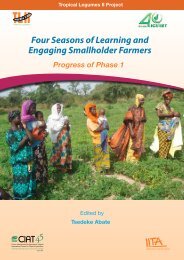Download - icrisat
Download - icrisat
Download - icrisat
You also want an ePaper? Increase the reach of your titles
YUMPU automatically turns print PDFs into web optimized ePapers that Google loves.
82<br />
A global crop – Sweet sorghum used to be the least famous of those species that catch the CO 2<br />
from the air and<br />
turn it into food, feed, fuel, fertilizer for man and beast – and help mitigate global warming for all of us sinners &<br />
saints, black & white & brown. I happen to believe that sweet sorghum is the best climate crop of them all, for 7<br />
reasons; here’s a summary of what I said about it in ‘The Yankee Dawdle. On Discovery Sorghum, The Great<br />
Climate Crop,’ earlier published in American Chronicle:<br />
(1) Sorghum is a much cheaper source of ethanol for blending with gasoline<br />
than sugarcane.<br />
(2) It is plantable in wastelands, drylands and wetlands, so it does not have<br />
to compete for space with major food crops like rice, wheat and corn.<br />
(3) Like rice, sweet sorghum is a cash crop; it grows fast and the farmer<br />
harvests in 4 months.<br />
(4) Since it thrives even on poor soils, sweet sorghum can save on millions<br />
of dollars of fossil fuel-based fertilizer imports where the optimum – not<br />
the maximum – sustainable yield is the objective.<br />
(5) Sweet sorghum is the crop of millions of poor farmers, and therefore any<br />
increased need for the harvest increases their benefits from their crop.<br />
(6) Cultivating sweet sorghum as crop for ethanol production will save more<br />
millions of dollars in terms of fossil fuel non-imports than corn or<br />
sugarcane.<br />
(7) An ethanol distillery based on sweet sorghum is less polluting than that<br />
based on sugarcane or corn.<br />
A global reach and<br />
impact - Today Africa,<br />
tomorrow the world.<br />
Already, ICRISAT has<br />
regional centers and<br />
research stations in<br />
Africa: Kenya, Niger,<br />
Mali, Zimbabwe, Malawi,<br />
Mozambique. ICRISAT is<br />
now reaching out to<br />
Asian and American<br />
countries with its sweet<br />
sorghum initiative.<br />
A global vision – ICRISAT’s global vision is ‘Science with a Human Face.’ A<br />
‘corporate vision is a short, succinct, inspiring statement of what the<br />
organization intends to become and to achieve at some point in the future’ (1000ventures.com). ‘Corporate success<br />
depends on the vision articulated by the chief executive or the top management.’ As chief executive of ICRISAT, Dar<br />
has been articulating this global vision for 7 years now. I have not seen or read a vision more global than that for<br />
science. So: Sweet sorghum for ethanol production is a global crop with a global vision.<br />
A global mission – A mission must be that which is designed to help bring about a vision. With that in mind, as I see<br />
it, ICRISAT’s advocacy of a ‘Grey to Green Revolution’ (William Dar 2007, Nurturing Life In The Drylands Of<br />
Hope, ICRISAT, Andhra Pradesh, India, in CD) is the Institute’s global mission. So: Growing sweet sorghum for<br />
ethanol production is implementing a Grey to Green Revolution towards achieving a global vision.<br />
A global strategy – From Vadim Kotelnikov (2001, 1000ventures.com), we learn that a strategy is ‘the way in<br />
which a company orients itself towards the market in which it operates and towards the other companies in the<br />
marketplace against which it competes. It is a plan an organization formulates to gain a sustainable advantage<br />
over the competition.’ As I see it, sweet sorghum was chosen by ICRISAT as its climate crop not for maximizing<br />
production but for optimizing it: what you sow is what you get (wysiwyg). To optimize is to make the most of what<br />
An Inconvenient Truth

















